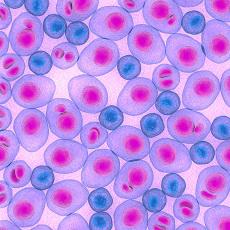
Cancer begins in your cells, which are the building blocks of your body. Normally, your body forms new cells as you need them, replacing old cells that die. Sometimes this process goes wrong. New cells grow even when you don't need them, and old cells don't die when they should. These extra cells can form a mass called a tumor. Tumors can be benign or malignant. Benign tumors aren't cancer while malignant ones are. Cells from malignant tumors can invade nearby tissues. They can also break away and spread to other parts of the body.
Cancer is not just one disease but many diseases. There are more than 100 different types of cancer. Most cancers are named for where they start. For example, lung cancer starts in the lung, and breast cancer starts in the breast. The spread of cancer from one part of the body to another is called metastasis. Symptoms and treatment depend on the cancer type and how advanced it is. Most treatment plans may include surgery, radiation and/or chemotherapy. Some may involve hormone therapy, immunotherapy or other types of biologic therapy, or stem cell transplantation.
- Cancer (National Library of Medicine)... extra cells can form a mass called a tumor. Tumors can be benign or malignant. Benign tumors aren't cancer while malignant ones are. Cells from malignant tumors can invade nearby tissues. They can also break ...
- Benign Tumors (National Library of Medicine)Tumors are abnormal growths in your body. They can be either benign or malignant. Benign tumors aren't cancer. Malignant ones are. Benign tumors grow only in one place. They cannot spread ...
- Brain Tumors (National Library of Medicine)A brain tumor is a growth of abnormal cells in the tissues of the brain. Brain tumors can be benign, with no cancer cells, or ... cells that grow quickly. Some are primary brain tumors, which start in the brain. Others are metastatic, ...
- Childhood Brain Tumors (National Library of Medicine)Brain tumors are abnormal growths inside the skull. They are among the most common types of childhood cancers. Some are benign tumors, which aren't cancer. They can still be ...
- Pituitary Tumors (National Library of Medicine)... functions of other glands in the body. Pituitary tumors are common, but often they don't cause health problems. Most people with pituitary tumors never even know they have them. The most ...
- Tumors and Pregnancy (National Library of Medicine)Tumors during pregnancy are rare, but they can happen. Tumors can be either benign or malignant. Benign tumors aren't cancer. Malignant ones are. The most ... and stage of your cancer. Another type of tumor that women can get is called a gestational ...
- Acoustic Neuroma (National Library of Medicine)An acoustic neuroma is a benign tumor that develops on the nerve that connects the ear to the brain. The tumor usually grows slowly. As it grows, it presses ...
- Carcinoid Tumors (National Library of Medicine)Carcinoid tumors are rare, slow-growing cancers. They usually start in the lining of the digestive tract or in ... carcinoids is about 60. In later stages the tumors sometimes produce hormones that can cause carcinoid syndrome. ...
- Wilms Tumor (National Library of Medicine)Wilms tumor is a rare type of kidney cancer. It causes a tumor on one or both kidneys. It usually affects ... are at risk should be screened for Wilms tumor every three months until they turn eight. Symptoms ...
- Alpha Fetoprotein (AFP) Tumor Marker Test What is an AFP (alpha-fetoprotein) tumor marker test? An AFP tumor marker test is a blood ... liver cancer. Why do I need an AFP tumor marker test? You may need an AFP tumor ...



